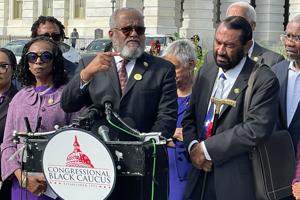Entertainment
Supreme Court Faces Critical Voting Rights Case Amid Racial Tensions

The ongoing debate over voting rights in the United States has intensified as the U.S. Supreme Court considers a crucial case from Louisiana concerning gerrymandering that may dilute the Black vote in congressional districts. This issue highlights the continuing struggles with race relations in the country, as noted by the late Smiley Anders in his reflections on the state of racial issues.
The Supreme Court is currently reviewing a case that challenges the way congressional districts have been drawn in Louisiana. This legal battle has implications for the representation of Black voters in the state, raising significant concerns about the integrity of the electoral process.
Concerns Over the Voting Rights Act
Justice John Roberts, during the deliberations on the Voting Rights Act of 1965, previously expressed concern regarding how long this landmark legislation should remain in effect. His comments came in relation to a prior decision involving the Act, known as the Shelby County decision, which questioned the ongoing necessity of federal oversight in voting rights.
In response to Roberts’ concerns, Anders articulated a critical point: the question of when or if the Voting Rights Act will cease to be relevant remains unanswered. “Until that day ever comes,” he argued, “the Voting Rights Act of 1965 should remain the law of the land.” This perspective underscores the importance of maintaining protections for voters, particularly in light of historical and ongoing racial discrimination in the electoral process.
Focus on Local Issues
Furthermore, Anders urged state legislators to redirect their focus from political power struggles to addressing the pressing issues facing Louisiana. He emphasized the need for lawmakers to engage with the real challenges that affect their constituents rather than entrenching themselves in efforts to secure their own positions.
Alex Chapman, a resident of Ville Platte, echoes this sentiment, advocating for a legislative approach that prioritizes the welfare of the community over political maneuvering. The call for reform reflects a broader desire among citizens for a political landscape that is more representative and responsive to the needs of all voters, particularly marginalized groups.
As the Supreme Court deliberates this case, the future of voting rights in Louisiana—and potentially across the United States—hangs in the balance. The outcome could have significant repercussions for how electoral districts are drawn and how effectively the voices of all citizens are heard in the political arena.
The stakes are high as the nation continues to grapple with its history of racial inequality, making the preservation of the Voting Rights Act not just a legal concern but a moral imperative for ensuring fair and equitable representation for all.
-

 Science3 weeks ago
Science3 weeks agoInterstellar Object 3I/ATLAS Emits Unique Metal Alloy, Says Scientist
-

 Science3 weeks ago
Science3 weeks agoResearchers Achieve Fastest Genome Sequencing in Under Four Hours
-

 Politics3 weeks ago
Politics3 weeks agoAfghan Refugee Detained by ICE After Asylum Hearing in New York
-

 Business3 weeks ago
Business3 weeks agoIconic Sand Dollar Social Club Listed for $3 Million in Folly Beach
-

 Health3 weeks ago
Health3 weeks agoPeptilogics Secures $78 Million to Combat Prosthetic Joint Infections
-

 Lifestyle3 weeks ago
Lifestyle3 weeks agoJump for Good: San Clemente Pier Fundraiser Allows Legal Leaps
-

 Science3 weeks ago
Science3 weeks agoMars Observed: Detailed Imaging Reveals Dust Avalanche Dynamics
-

 World3 weeks ago
World3 weeks agoUS Passport Ranks Drop Out of Top 10 for First Time Ever
-

 Health3 weeks ago
Health3 weeks agoResearcher Uncovers Zika Virus Pathway to Placenta Using Nanotubes
-

 Entertainment3 weeks ago
Entertainment3 weeks agoJennifer Lopez Addresses A-Rod Split in Candid Interview
-

 Business3 weeks ago
Business3 weeks agoSan Jose High-Rise Faces Foreclosure Over $182.5 Million Loan
-

 Top Stories3 weeks ago
Top Stories3 weeks agoChicago Symphony Orchestra Dazzles with Berlioz Under Mäkelä









